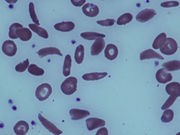

The anti-clotting drug prasugrel does little to reduce the risk of pain crises in children with sickle cell disease, a new study shows.
The research included 341 patients in 13 countries in Africa, the Americas, Asia, Europe and the Middle East. About half took prasugrel (Effient) for between nine and 24 months. The other half took a placebo.
There was little difference between the two groups in rates of pain crises caused by interrupted blood flow in small blood vessels, the scientists found. Over time, repeated pain crises lead to tissue damage and chronic inflammation.
The study was led by researchers at Dana-Farber/Boston Children’s Cancer and Blood Disorders Center and University of California, San Francisco’s Benioff Children’s Hospital Oakland.
“Although we were disappointed that prasugrel does not appear to ease the suffering of children with sickle cell disease, the fact that this study incorporated patients in the wide range of countries where the disease occurs is hugely significant,” study co-lead author Dr. Carolyn Hoppe, a pediatric hematologist/oncologist at the UCSF hospital, said in a Dana-Farber news release.
“The logistical challenges that we addressed in designing and implementing the study can serve as a model for future research,” she added.
Sickle cell disease affects about 100 million children and adults worldwide, the researchers said. About 100,000 people in the United States, primarily those of African-American descent, have sickle cell disease, the researchers noted.
In the United States, there is only one drug — hydroxyurea — approved to treat pain crises in people with sickle cell disease. However, the drug is not effective in all patients. Although the drug is only approved for use in adults, it’s commonly prescribed for children.
The findings were published Dec. 8 in the New England Journal of Medicine.
More information
The U.S. National Heart, Lung, and Blood Institute has more about sickle cell disease.
Source: HealthDay
Copyright © 2024 HealthDay. All rights reserved.

Leave a Reply